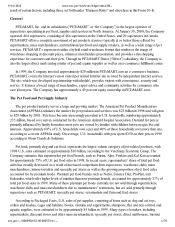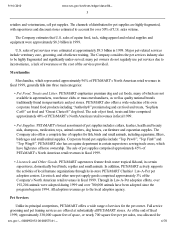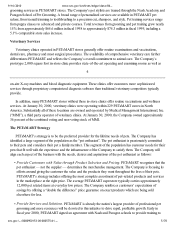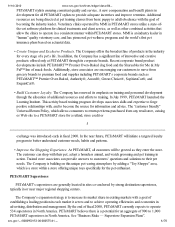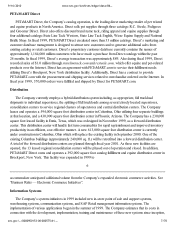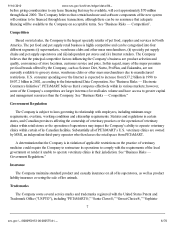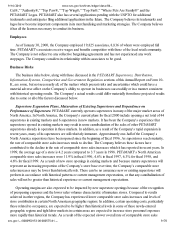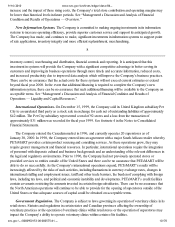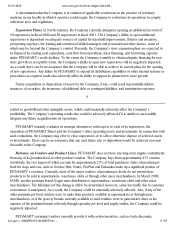Petsmart 2000 Annual Report Download - page 13
Download and view the complete annual report
Please find page 13 of the 2000 Petsmart annual report below. You can navigate through the pages in the report by either clicking on the pages listed below, or by using the keyword search tool below to find specific information within the annual report.
2001. The locations of these new forward distribution centers are: Colombus, Ohio; Hagerstown, Maryland;
Atlanta, Georgia and Las Vegas, N evada. There can be no assurance, however, that the C ompany will be able
to realize any labor and other cost savings as a result of the planned strategy.
Competition. The pet food and supply retailing industry is highly competitive. PETsMART competes with
supermarkets, warehouse clubs and mass merchandisers, many of which are larger and have significantly greater
resources than PETsMART. PETsMART also competes with a number of pet supply warehouse or specialty
stores, smaller pet store chains, Internet retailers and independent pet stores. The industry has become
increasingly competitive due to the entrance of other specialty retailers into the pet food and supply market, some
of which have developed store formats similar to PETsMART’ s, and due to the expansion of pet-related product
offerings in certain of the warehouse clubs and mass merchandisers. There can be no assurance the Company
will not face greater competition from these or other retailers in the future. In particular, if any of the C ompany’ s
major competitors seek to gain or retain market share by reducing prices, the Company may reduce its prices in
order to remain competitive, which could have a material adverse effect of the Company. The Company is also
facing additional competition from electronic commerce retailers who are entering the pet supply and pet food
market. See “Business Risks — Electronic Commerce Initiatives”.
Quarterly and Seasonal Fluctuations. The timing of new superstore openings may cause the Company’ s
quarterly results of operations to fluctuate. In addition, the Company’ s business is subject to some seasonal
fluctuation. PETsMART typically realizes a higher portion of its net sales and operating profit during the fourth
fiscal quarter. In addition, sales of certain of the Company’ s products and services designed to address pet
health needs, such as flea and tick problems, have been and are expected to continue to be negatively impacted
by the introduction of alternative pharmaceutical treatments, as well as by variations in weather conditions. In
addition, because PETsMART superstores typically draw customers from a large trade area, sales may be
impacted by adverse weather or travel conditions.
Anti-Takeover Measures. The PETsMART Restated Certificate of Incorporation, as amended (the
“Restated Certificate”) and the PETsMART Bylaws include provisions that may delay, defer or prevent a change
in management or control that holders of Notes or stockholders might consider to not be in their best interests.
These provisions include (i) a classified Board of Directors consisting of three classes, (ii) the ability of the Board
of Directors to issue without stockholder approval up to 10,000,000 shares of preferred stock in one or more
series with such rights, obligations, and preferences as the Board of Directors may determine, (iii) no right of
stockholders to call special meetings of stockholders, (iv) no right to stockholders to act by written consent and
(v) certain advance notice procedures for nominating candidates for election to the Board of Directors. In
addition, the Restated Certificate requires a 66 2/3% vote of stockholders to (i) alter or amend the PETsMART
By- laws, (ii) remove a director without cause, or (iii) alter, amend or repeal certain provisions of the Restated
Certificate. The Restated Certificate does not permit cumulative voting. In August 1997, the Company’ s Board
of Directors adopted a Share Purchase Rights Plan, commonly referred to as a “poison pill.” The C ompany is
subject to the anti-takeover provisions of Section 203 of the Delaware General Corporation Law, which
prohibits the Company from engaging in a “business combination” with an “interested stockholder” for a period
of three years after the date of the transaction in which the person
11
became an interested stockholder, unless the business combination is approved in a prescribed manner. The
application of Section 203 could have the effect of delaying or preventing a change of control of the Company.
9/16/2010 www.sec.gov/Archives/edgar/data/86…
sec.gov/…/0000950153-00-000575-d1.… 13/70


